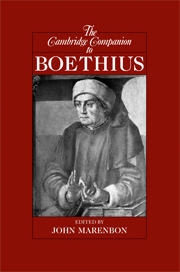Book contents
- Frontmatter
- Introduction: reading Boethius whole
- Part 1 Before the Consolation
- Part II The Consolation
- 8 The Good and morality: Consolatio 2-4
- 9 Fate, prescience and free will
- 10 Interpreting the Consolation
- 11 The Consolation: the Latin commentary tradition, 800-1700
- 12 The Consolation and medieval literature
- Appendix: Boethius’ works
- Bibliography
- Index: References to Boethius' works
- General Index
- Series list
9 - Fate, prescience and free will
from Part II - The Consolation
Published online by Cambridge University Press: 28 July 2009
- Frontmatter
- Introduction: reading Boethius whole
- Part 1 Before the Consolation
- Part II The Consolation
- 8 The Good and morality: Consolatio 2-4
- 9 Fate, prescience and free will
- 10 Interpreting the Consolation
- 11 The Consolation: the Latin commentary tradition, 800-1700
- 12 The Consolation and medieval literature
- Appendix: Boethius’ works
- Bibliography
- Index: References to Boethius' works
- General Index
- Series list
Summary
The reconciliation of divine foreknowledge and human freedom is the culmination of the Consolation of Philosophy. Boethius' is the most persuasive attempt in Greco-Roman antiquity to solve the problem, and the basis for subsequent medieval discussion. Whether it is successful, and whether the issue is now of any interest except as a philosophical exercise, may be questioned; Boethius' treatment is however of great historical importance. The details of his argument, and its relation to his own earlier work and that of his predecessors, are controversial. In this chapter I will begin by considering in the section on 'Future truth and the Commentaries on Aristotle's On Interpretation' not the Consolation but the two Commentaries on Aristotle's On Interpretation 9. These are chiefly concerned not with the problem of divine foreknowledge but with that of future truth; but they are doubly relevant to the Consolation, first because they make points which are taken up in the argument in the Consolation, and second because comparison with the Commentaries shows how the Consolation goes beyond them. Philosophy at C V.4.1 refers to Boethius' earlier consideration of the issues (see below); this gives us Boethius' own warrant for considering the Consolation and Commentaries together.
I then proceed to consider the argument in the Consolation. In the section on 'Providence and fate' I consider the discussion of fate and providence at the end of book 4. In the section on 'The ingredients in Boethius' solution to the foreknowledge problem in the Consolation' the three essential elements in Boethius' solution to the problem of divine foreknowledge are identified and discussed.
- Type
- Chapter
- Information
- The Cambridge Companion to Boethius , pp. 207 - 227Publisher: Cambridge University PressPrint publication year: 2009
- 5
- Cited by

